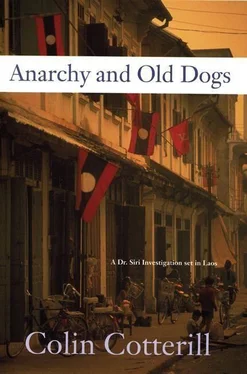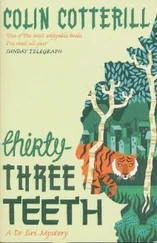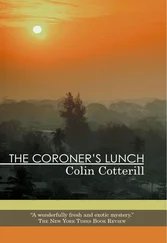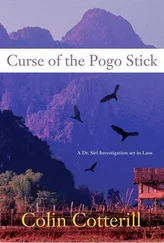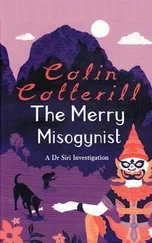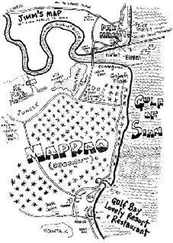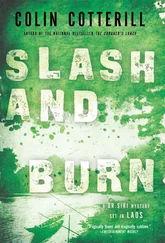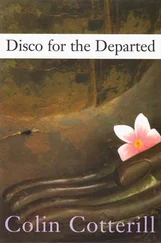Colin Cotterill - Anarchy and the Old Dogs
Здесь есть возможность читать онлайн «Colin Cotterill - Anarchy and the Old Dogs» весь текст электронной книги совершенно бесплатно (целиком полную версию без сокращений). В некоторых случаях можно слушать аудио, скачать через торрент в формате fb2 и присутствует краткое содержание. Жанр: Криминальный детектив, на английском языке. Описание произведения, (предисловие) а так же отзывы посетителей доступны на портале библиотеки ЛибКат.
- Название:Anarchy and the Old Dogs
- Автор:
- Жанр:
- Год:неизвестен
- ISBN:нет данных
- Рейтинг книги:3 / 5. Голосов: 1
-
Избранное:Добавить в избранное
- Отзывы:
-
Ваша оценка:
- 60
- 1
- 2
- 3
- 4
- 5
Anarchy and the Old Dogs: краткое содержание, описание и аннотация
Предлагаем к чтению аннотацию, описание, краткое содержание или предисловие (зависит от того, что написал сам автор книги «Anarchy and the Old Dogs»). Если вы не нашли необходимую информацию о книге — напишите в комментариях, мы постараемся отыскать её.
Anarchy and the Old Dogs — читать онлайн бесплатно полную книгу (весь текст) целиком
Ниже представлен текст книги, разбитый по страницам. Система сохранения места последней прочитанной страницы, позволяет с удобством читать онлайн бесплатно книгу «Anarchy and the Old Dogs», без необходимости каждый раз заново искать на чём Вы остановились. Поставьте закладку, и сможете в любой момент перейти на страницу, на которой закончили чтение.
Интервал:
Закладка:
Colin Cotterill
Anarchy and the Old Dogs
A Note to a Blind Dentist
The post office box was eighteen across, twelve down, and it had a loop of wool wound around the door so Dr. Buagaew wouldn’t miss it. He traced the keyhole with his left hand and inserted the key with his right. From inside the wooden chamber came the scent of bygone correspondence: of brown-paper parcels and glue, of old parchment and secrets. His hand fell upon a thin envelope. He knew it would be there and he knew what it contained because only one other person was aware of the post office box address.
He relocked the door, folded the envelope, and, having put it in the inside pocket of his jacket, turned back in the direction of the exit. The Bureau de Poste was crowded. It always seemed to be so. He could hear the unruly scrum of ignorant villagers fighting their way to the counters. There were the sounds of pencils tapping urgent messages on postcards and the crinkle of the thirty- kip wrapping service. On the far side of the room, people shouted loudly into the long-distance telephones, sharing their most intimate stories with half of Vientiane.
It was all part of the hubbub of the city that Dr. Buagaew disliked so much. If it hadn’t been for the letters he wouldn’t have traveled there at all. It was his habit to get off the bus beside the morning market, cross over Khu Vieng Avenue, collect his mail, and return on the same bus. He had no other business. In the capital of the People’s Democratic Republic of Laos in August of 1977, traffic wasn’t a fitting word to describe the infrequent passings of motor vehicles. Only those with familial or professional connections with the socialist government could afford to tantalize their tanks with petroleum. Two cars passing at the same time would be considered a traffic jam. Even midmorning, dogs stretched out on the warm asphalt and motorists had no qualms about going around them.
That might be the reason Dr. Buagaew had never considered the road to be a potential danger. It could explain why he didn’t stop at the broken stone curb or take a great deal of notice of the engine sound. Once his bamboo cane had negotiated the cracks and potholes of the sidewalk, all that remained was to find the wire-mesh fence on the far side and follow it to his bus stop. The onlookers later concurred. They’d never seen anyone hit by a truck before, and it was such an unlikely event a man would almost have to throw himself beneath the front wheels for it to happen. Even then, the vehicle would probably be traveling slowly enough to slam on the brakes and avoid any embarrassment.
It was therefore agreed the old blind man must have been in deep karmic debt to have stepped in front of the runaway logging truck. What were the odds? A large Chinese vehicle? A stuck accelerator? A young driver bailing out in panic some twenty yards earlier? The truck had careened past the post office and crushed Dr. Buagaew before slamming into the wooden public-address-system pole at the corner of Lan Xang Avenue. The latter stood defiantly for several seconds before swaying and crashing down onto the empty street.
This tragedy was a talking point that afternoon but very few tears were shed for the anonymous blind man. The locals didn’t have room in their souls for someone else’s misfortune. Vientiane had a certain mood about it these days. The government was starting to look like a depressingly unloved relative who’d come to visit for the weekend and stayed for two years. These were uncomfortable times in a country not unused to discomfort. The drought had wrung every last tear of moisture from the sad earth. The seasonal monsoons had held off, and a few brief mango flower showers were quickly sucked into the ground and forgotten. The World Bank was donating rice, but with few trucks and little petrol, most of it hadn’t found its way beyond the cities.
It would be a good time, one would imagine, for a novice socialist government to ease up and give its downtrodden population a break from petty regulations. The Pathet Lao had come to power in 1975 and even the prime minister admitted they hadn’t achieved too much since then. But the jungle-trained administration adopted a policy of disguising its lack of ability by baffling the populace with red tape. No fewer than six signatures were needed for permission to ride a bicycle from one prefecture to another. The death of livestock, even from natural causes, had to be accounted for in writing. And heaven help a family intent on adding an extension to its hovel. A small copse of trees’ worth of paper and an entire octopus of ink would be used up by the ensuing paperwork.
Some fifty thousand former Royalist officials were now in reeducation camps, and the positions they once occupied had been either left empty or filled with Party cadres unqualified for the work. They all did their best, but best doesn’t always amount to competent.
The Footpath Fortune-Teller
Dr. Siri Paiboun, the country’s one and only coroner, was in the morgue rolling a testicle between his thumb and forefinger. It was a peculiar sensation. He held it up to the light to catch its opaqueness and took a photograph of it. He then placed it beside its comrade on the table in front of him and took one more snap of the couple together.
“You know? They’re marvels, really they are,” he said.
“How so?”
Nurse Dtui was rummaging impatiently through the drawer for a suitable bag to put them in. She was a pretty girl in her twenties with a smile that won hearts. Her ice white uniform stretched across her solid block of a body, giving her the appearance of a large standing refrigerator, albeit a very happy one.
“They don’t look like much,” Siri said, “but these little fellows are the powerhouse of every sexual event that takes place in a man’s body. They pump out testosterone to advertise virility and attract the female, they stimulate an erection, and they produce sperm to fertilize the ovum. And with all that responsibility, there isn’t even a place for them inside. They have to dangle there like afterthoughts. Damned inconsiderate of the Maker if you ask me.”
“I doubt these’ll be making any more contributions to the procreation of the species, what with having been fried and all,” Dtui said and smiled as she held up an envelope of stapled paper that had once contained banana fritters. “This’ll do.”
“You seem to be in somewhat of a hurry, Nurse Dtui.”
“It’s Wednesday. Don’t want to miss my fortune-telling appointment.”
“Aren’t you supposed to be tending vegetables for the republic or some such after-hours nursing duty?”
“I can do that after my reading. It doesn’t take half an hour.”
“I’m disappointed in you, really I am. Surely you don’t believe all that clairvoyant bunkum?”
“That’s good, coming from you.”
“Meaning what?”
“Let me just make sure I’ve got this right. A man who hosts the spirit of a thousand-year-old Hmong shaman-a man who’s being pursued by the malevolent spirits of the jungle-a man who is regularly visited by the ghosts of murder victims…”
“This sounds like one hell of a man.”
“… a man who has no fewer than thirty-three teeth crammed together in his magical mouth, which positively proves his connections to the spirit world, believes that fortune-telling is bunkum?”
“Absolutely. It’s a load of rot. The future’s a pimple on your nose. No matter how fast you run, you’ll never catch up with it. Nor should you try to.”
“That sounds suspiciously like one of Judge Haeng’s Party slogans.”
“Not at all. It’s mine. Nobody can profess to know the future. Those fortune-teller charlatans make a living out of telling gullible folks what they want to hear.”
Читать дальшеИнтервал:
Закладка:
Похожие книги на «Anarchy and the Old Dogs»
Представляем Вашему вниманию похожие книги на «Anarchy and the Old Dogs» списком для выбора. Мы отобрали схожую по названию и смыслу литературу в надежде предоставить читателям больше вариантов отыскать новые, интересные, ещё непрочитанные произведения.
Обсуждение, отзывы о книге «Anarchy and the Old Dogs» и просто собственные мнения читателей. Оставьте ваши комментарии, напишите, что Вы думаете о произведении, его смысле или главных героях. Укажите что конкретно понравилось, а что нет, и почему Вы так считаете.
